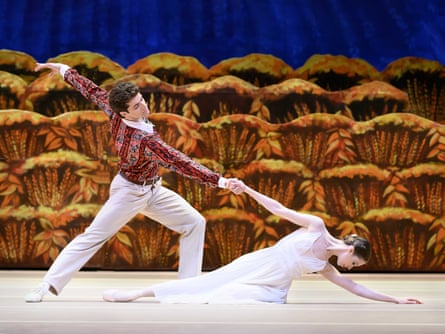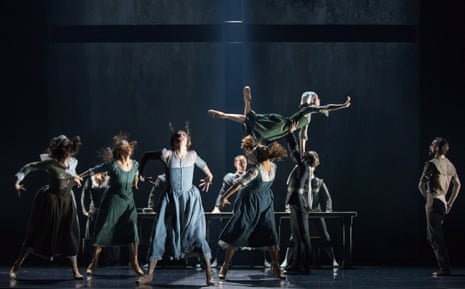It’s surprisingly hard to make a new narrative ballet that captures hearts and minds. Swan Lake, Giselle and The Sleeping Beauty are so regularly performed because they somehow speak beyond their formal steps to something deeper in the human soul. In recent years, Christopher Wheeldon (particularly with 2011’s Alice’s Adventures in Wonderland) and Alexei Ratmansky (see below) have begun to find new themes that resonate. John Neumeier keeps flying the torch in works that are popular on the continent. But there aren’t many new works that tell stories to rival the old.
So the American choreographer Helen Pickett’s retelling of Arthur Miller’s 1953 play The Crucible for Scottish Ballet (premiered at the Edinburgh international festival last week, then touring) is a double pleasure. A blazing interpretation of the story, it also feels as if it has the potential to become a modern classic.
Pickett, formerly a dancer with William Forsythe’s Ballett Frankfurt, also performed with the Wooster Group, and those radical antecedents are clearly visible in the expressionistic, theatrical style of her deeply individual choreography, full of expressive arms and fine details. She cleverly decides to start the action of her Crucible in the background events Miller only hints at: the sexual awakening of Abigail, John Proctor’s maid, and their subsequent affair. Constance Devernay is beguiling as Abigail, moving from playing with dolls to the extended lines of sexual longing, her hands flicking out in movements of desire and self-realisation.
Pickett also finds a vocabulary for the character of Proctor’s wife, Elizabeth (lovely Araminta Wraith), her hunched shoulders and crossed arms indicative of repression and grief; her later softening a sign of reconciliation. When Elizabeth discovers John and Abigail together, it’s like a lightning bolt, triggering the rejection that will tear the puritanical community apart, leading to tragedy and death.
Lust, love, desire – these are all perfect subjects to express through dance, and they provide a brilliant frame and contrast for the group hysteria of the subsequent witch trials. If the ballet struggles fully to explain the crisis of conscience that sends Proctor (danced with searing intensity and soaring tormented jumps by Nicholas Shoesmith) to his doom, it has already gripped so strongly by that point that it can be forgiven.
Pickett is also superb at sending groups of dancers around the stage, creating her effects with great waves of movement – skittering steps on point for the teenage accusers; prim hands pushed up in prayer for the righteous; strong, sharp jumps for the dark-suited judges; terrified convulsions for upright citizens wrongly condemned. It’s all brilliantly realised by the company, and supported by a shattering score by the aptly named Peter Salem. With great skill he matches sound to action: a great clatter of drums for Proctor’s unleashed passion; a whomp of violins for the wild and whirring Walpurgis night dances in the woods; screeches of strings as people meet their fate.
Designed (by Emma Kingsbury and David Finn) in dark hues, leavened by soft, forest pastels, and danced in shadowy patches (Finn again) with a cross of light falling across the stage, The Crucible feels like a keeper.
The Bright Stream, choreographed in 2003 by Alexei Ratmansky, is already a rare and precious thing: a narrative ballet that actually makes you laugh out loud. It is one of the brightest jewels in the Bolshoi’s repertory and I don’t understand why audiences don’t flock to it, instead of their rather peculiar Swan Lake.
The Bright Stream’s pure joyfulness is all the more surprising because it has dark antecedents. Shostakovich, who wrote the score, the original choreographer Fyodor Lopukhov, and the librettist Adrian Piotrovsky all ended up in disgrace after its 1935 premiere because its portrayal of life on a collective farm was not regarded as sufficiently serious by the Stalinist authorities. Ratmansky honours them by revealing the brilliance of their original concept, the sheer fizz and panache of a story of a troupe of artists visiting a rural harvest festival, and featuring a man dressed in a long white tutu, a ballerina being butch, giant vegetables and a dog on a bicycle.
Ratmansky’s sizzling choreography reveals the staggering technique and skill of the Bolshoi dancers, while using their dazzle for comic ends. There are endless pirouettes, and sky-high, twisting leaps that make you laugh as well as marvel. Performing amid Boris Messerer’s riotously colourful and patterned designs (complete with flying tractors and a real train), the dancers seem liberated, full of the fun of it all.
On Thursday, dashing principal Ruslan Skvortsov revealed blissful comic timing as he cavorted on pointe as a sylph, evading the clutches of a lecherous dacha-dweller, falling to the floor in mock outrage. The wit comes from the way that Skvortsov never overdoes it; he performs the steps even as he mocks them. Ekaterina Krysanova as the ballerina also deliciously caught the humour. She has such a strong presence, her eyes flashing as she teases her suitors and then flies around the stage in jumps that seem weightless. As the star-crossed leads, Daria Khokhlova revealed a touching tenderness and hurt, while Igor Tsvirko was sweet and buoyant enough to make her forgiveness of him understandable. The company were a pleasure in every part they danced. Just heaven.

Star ratings (out of five)
The Crucible ★★★★
The Bright Stream ★★★★★
